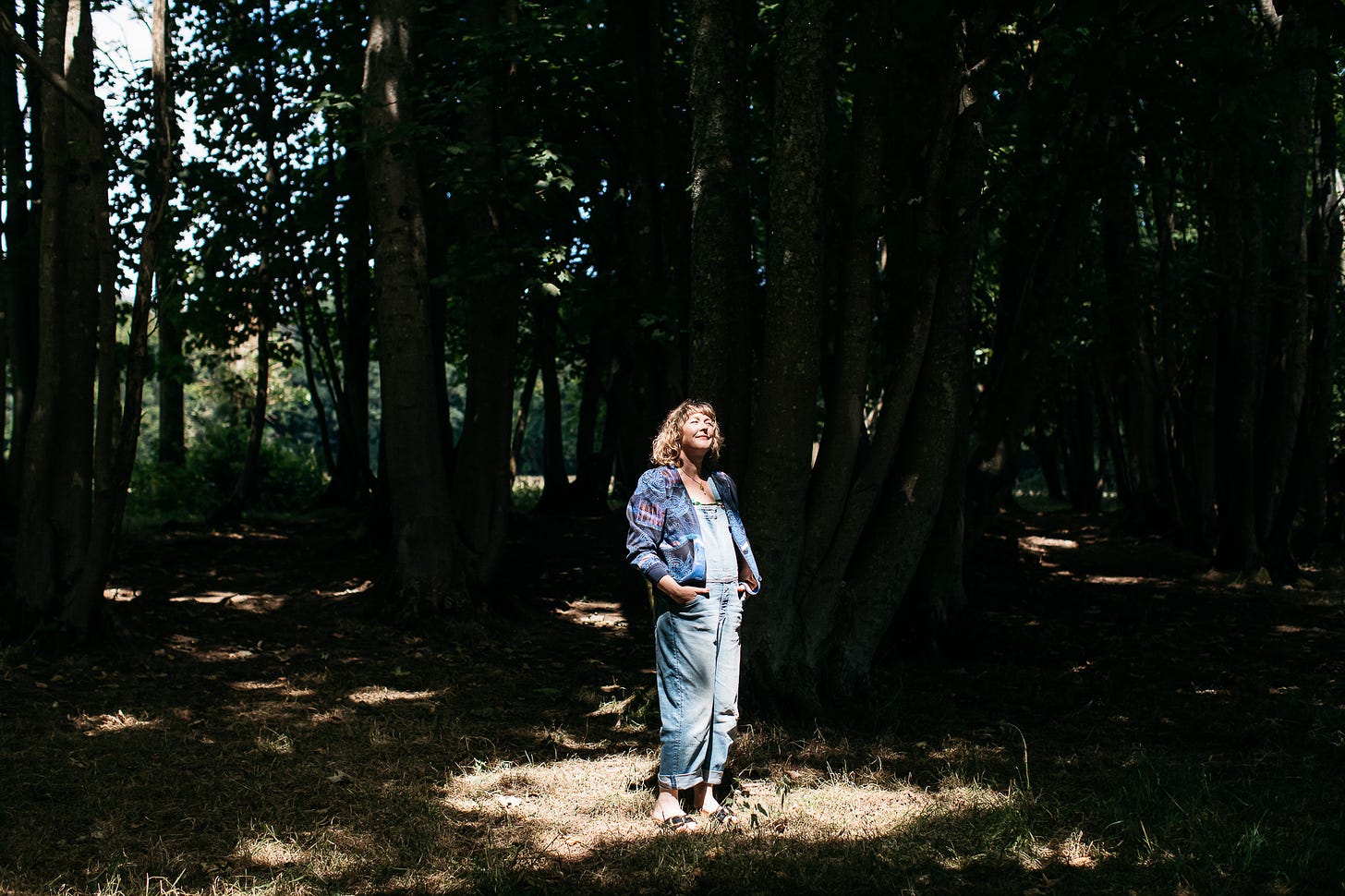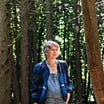Andrea Anderson: writer, career coach and late discovered autist
'I found school excruciatingly difficult, there’s not one aspect I look back on with fondness,' writes Andrea Anderson, who discovered that she was autistic while exploring her son's neurodivergence.
What was your upbringing like?
I was born into two coal mining Scottish clans: the Andersons and Campbells.
My early years were spent in Scotland amongst this huge family.
On the maternal side there were often noisy gatherings amongst a gaggle of cousins where I would dance and sing amongst them with my version of Blondie and Abba.
Anxiety started for me outside of this family setting. I felt cripplingly shy, constantly worried about how I was supposed to behave or communicate.
My parents were very hardworking and aspirational, especially my mum.
We moved to England when I was eight, during times of great economic turmoil in the North. Our move was for my dad’s career progression.
That’s when my life became really difficult. I felt acutely alien and this is when my heavy masking and camouflaging felt necessary to survive.
How did you find school?
I found school excruciatingly difficult, there’s not one aspect I look back on with fondness.
Secondary school was especially difficult to navigate. I found the nuanced and complex dynamic amongst girls perplexing.
I found friendships with boys more straightforward. My directness, whilst unusual, was more tolerated with boys, until I declined their unwanted attention as a teen.
Amongst the masking of my difficulty, bewilderment in how to make safe friends and the constant monitoring/analysis of every interaction, I was overwhelmed, exhausted and often ill.
I had little energy to learn. I didn’t do well academically. I carried a belief that I was not very clever and that there was something lacking in me.
My senses are a vibrant entry points to amazing sounds, images and feelings. I often think in song lyrics, poems, colours, landscapes and scenes.
What were you like, as a child?
At home, I loved music, singing, dancing and books, TV and film. I treasured the escapism they offered me. My bedroom was a haven of peace and creative escape. Outside of these safe places I was described as a quiet, shy, worrier. Jumpy, easily startled because of my endless day-dreaming.
My endless questions at home were tolerated as a young child. My need to understand ‘why’ was less welcome as I grew up. It was seen as a sign of disobedience. They wanted me to make everyone’s life easier by simply complying without question.
How did you find the social side of life?
Outside of my family, I found it really difficult to join in. I’d often stand alone on the sidelines wishing I was invisible so I could just observe without expectation to perform.
I found group play or sport activity torturous. I just wanted to escape into my imagination.
The cultural difference between Scotland and England was huge to me in my formative years. In England, the “play” felt more centred around rules, competition and a lot to do with individual performance.
For me, deep friendship with one girl or a small group of three was, and still is, my preference. I found it harder to connect this way in the social activities I was subjected to from eight onwards.
What was higher education like for you (if you attended)?
I had no sense of strong vocation or what I might pursue beyond school. I had no idea about creative jobs or careers.
In the 90’s, my career choices were limited to a non-descript “working in an office” or pursuit of a skilled trade.
As my education coincided with Thatcherism, I became curious about the boom of business. Being a literal thinker I pursued this with a BTEC in Business and Finance.
With a natural fascination for people this led me into Human Resources (a term I now detest; humans should never be merely considered as a resource).
I found it really difficult to talk to my family about being autistic
How did you feel, as you started your career?
I was desperate for independence and for someone to take me seriously.
I found that employers seemed impressed with my ability to think systemically and for an ability to get to the crux of a problem.
But they knocked my straight-talking edges off me early on. A new sophisticated form of masking began, as I climbed the greasy pole of progress in business.
What has motherhood been like, so far?
Motherhood has been the most challenging and rewarding aspect of my life. To experience unconditional love and to fully trust in my instinctive way to create emotional safety is deeply connecting.
I found it bewildering why I was so exhausted, stressed and struggling to cope when they were babies.
I now know this was due to being autistic and very likely ADHD. The sleep deprivation tipped me into a new level of overwhelm that I was ill prepared for.
The endless cycle of domestic drudgery is the worst.
Witnessing the growth of my two boys into amazing humans is my biggest joy in life.
Discovering our neurodivergence as a family has given all of us a deeper understanding of each other’s quirks, challenges and needs. I’m incredibly grateful for that.
When did you start to wonder if you might be autistic?
It didn’t come to me as wonder, it came as a shocking jolt of realisation.
It was inferred to me that my eldest child was autistic when he was three or four.
I refused to read or explore anything about autism.
I was terrified of autism. Such was my fear of it that I ninja’d it away from our child for a further four years.
It took me seeing him in deep distress at a school social event, when he was eight, to realise this effort to protect him, from something that I held in terror, was causing him harm.
The shocking jolt of my own shame and fear hit me like a juggernaut on that evening.
That led me to going head on into consuming any information I could get my hands on about autism.
As soon as I allowed myself to consider my beautiful boy through this new information lens, which made so much sense and brought him so much relief, it created a wide open space to consider myself differently.
In my consumption of information about autism I kept seeing the words “genetic link.” Instinctively, I knew that came from me.
I knew if I didn’t untangle myself from the shame of being different; autistic, he’d be forever tangled in it too.
I’m recovering from a lifetime of masking, camouflaging and mimicking living life to fit into a mould not made for me
How did you feel, when it was confirmed?
My autism diagnosis did not bring me the comfort I thought it would.
It felt validating for me to get it confirmed but I still had a long way to go before I could feel good about it.
I found it really difficult to talk to my family about being autistic. I think they find my openness about being autistic embarrassing and my straight-talking difficult.
I’ve developed a deeper understanding of the conditioning that has shaped their avoidance of standing out through difference.
This is part of what we need to navigate when we have a late life discovery of our own neurodivergence.
My autistic acceptance had to come from within. It was never going to come from the external acceptance that I’d been seeking for most of my life.
Late life neurodivergent discovery brings layers of pain and grief that eventually set you free from the burden of compliance.
How does it manifest?
Now, my neurodivergence manifests in all aspects of my life. How I think, feel, connect and experience the world.
As a 50-year-old, perimenopausal woman, my autism has liberated me from being ashamed, subservient and compliant.
My senses are a vibrant entry points to amazing sounds, images and feelings. I often think in song lyrics, poems, colours, landscapes and scenes.
I feel the world intensely. On my best days, I live in vibrant cinematic scenes with the most amazing soundtracks.
On my doubtful days I feel the world is too big, dark, cruel - and I am too small for it.
Can you tell us about the work you do now?
I’m an author, coach and educator.
My work allows me to illuminate people’s creative gifts and uniqueness, to ignite their passions and align them to new paths in how they work, love and live their neurodivergent lives.
I do this in a variety of ways, across different platforms: 1:1 coaching, in the learning community I’ve created - Belong…we are neurokin, writing books and giving talks on neuroinclusion in progressive businesses.
Does your neurodivergent mind help you with your work?
Yes, in absolutely everything I do and especially in my deepest area of interest: human growth and potential.
Growing up not knowing I was neurodivergent, in order to survive and adapt to typical ways, I had an endless fascination with how humans ‘worked’.
As a result of having to constantly alter how I communicate and connect with others to do well or to progress, learning is everything to me.
I’m grateful that I have attuned this deep interest in learning and growth to my output and contribution.
What challenges does it bring?
Feeling the world so intensely brings searing highs and crashing lows. Anxiety and overwhelm can paralyse me at times. Hormone depletion has added to that intensity and challenge.
I’m also recovering from a lifetime of masking, camouflaging and mimicking living life to fit into a mould not made for me.
Until recently I’ve been pushing myself to achieve success in ways that don’t adapt to my neurodivergence. No doubt, I will repeat this mistake a few times until I learn to live my neurodivergent life, for me.
How do you spend your time, when you’re not working?
I love music; singing in a choir, dancing at gigs, theatre, food, having connecting experiences with my favourite people and deep and meaningful exchanges about all aspects of life.
I love living in Brighton; cycling along the seafront and experiencing bursts of creative energy generated by the lively, alternative thinkers and justice seekers who dwell here.
Anything else you’d like to share about yourself, autism, work, motherhood, neurodivergence?
If you’re a woman who is curious about what neurodivergence might mean for you, here are my offerings:
On Substack:
belong…we are neurokin; a learning community for neurodivergent women’s growth.
My book:
This is who I am: the autistic woman’s creative guide to belonging.







Loved this interview. Thanks for this. The familiarity of it all is such a support. X
Thank you for sharing your experiences Andrea, I found this so relatable x